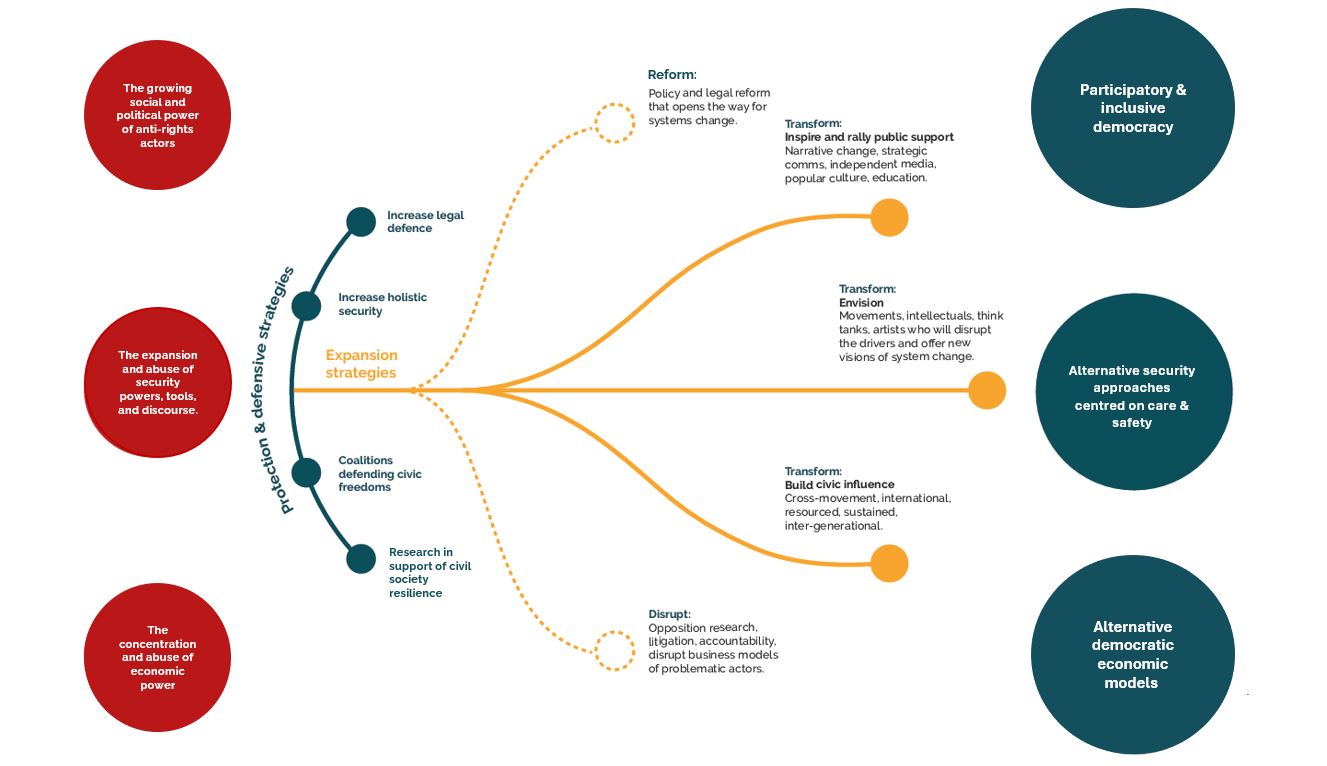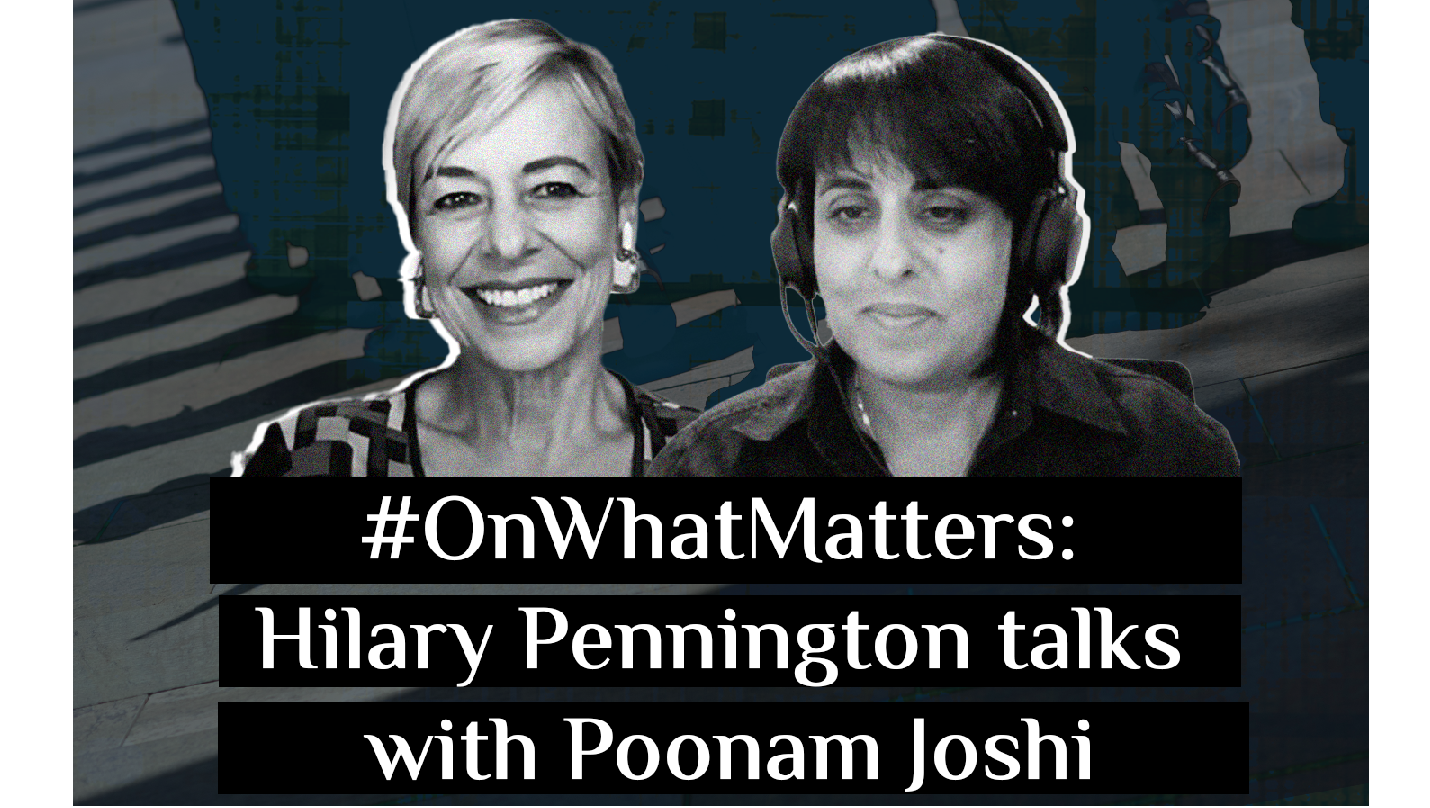
What do we mean by working as an ecosystem? Playbook for expanding civic space
In 2019 FICS undertook a landmark analysis, Rethinking Civic Space, which argued that the 2020s would be a crucial decade of transition and uncovered three key drivers that are eroding civic space for a wide range of movements.
In the years since, informed by this research, FICS has been advocating for taking an ecosystem approach to defend and expand civic space. We began to explore with allies in the field what an ecosystem approach can look like in practice and, through this, developed the ‘playbook for expanding civic space’.
The playbook is a visual map, intended as a conversation tool to help funders and civil society:
- Start a conversation about shared values and goals
- Locate their work in the range of approaches being funded to defend and expand civic space
- Identify where there is existing work that needs scaling up or gaps that need to be addressed either by individual organisations or in collaboration with others.
We are publishing the playbook visual, and some of the experiences we have gathered so far through trialling it, as a tool to help funders and civil society explore the roles they can play in expanding civic space so that new solutions for a better world take root.
Introducing the playbook for expanding civic space
The playbook is set out like a sporting field, with its “field of play” draw from FICS’ research into how progressive civil society and funders support civic space and how illiberal populists, religious conservatives, and regressive economic forces have gained political power and public support. On the left of the field are the systemic drivers closing civic space for rights-based and progressive movements: the growing social and political power of anti-rights actors; the expansion and abuse of security power, tools, and discourse; and the concentration and abuse of economic power. On the right are brief descriptors setting out a vision for a world where these drivers have been broken down and transformed into enablers: a world characterised by participatory and inclusive democracy; where policy and technological developments are shaped by rights-respecting and equitable definitions of security; and where alternative democratic economic models flourish.

Each category across the field – protect and defend, disrupt, reform, transform – highlights the different strategies needed to convert the drivers that close civic space into structures that will enable people and communities to secure political, social and economic transformation and protect human rights and the planet.
Strategies to defend civic space build the resilience and safety of progressive civic actors and defend the enabling legal environment for their work.
Strategies to expand civic space include
- Disrupt strategies, which discredit the actors and structures attacking progressive civil society or create financial or legal disincentives to halt harmful practices – e.g. Privacy International’s work to expose and challenge mass surveillance through legal action against the UK government.
- Reform strategies, which work incrementally, incentivising states and economic actors to protect and respect human rights and civic freedoms – e.g. the work of the Global NPO Coalition on FATF to ensure civil society is engaged in the debate on anti-money-laundering and combatting terrorism financing.
- Transform strategies, which focus on creating systemic change by empowering progressive civic actors to envision, inspire, and mobilise for alternative futures.
The playbook isn’t perfect – like any framework, we have to accept that the world is far more complex than it represents. What it tries to do is to serve as a conversation tool to help groups of actors develop a shared language and move toward action.
The strategies represented are not linear and they aren’t a hierarchy. “Disrupt” and “Reform” strategies are crucial for creating the openings that enable transformative ideas to cut through. And we have seen powerful examples – particularly in feminist funding spaces – where resourcing for protective and transformative strategies are blended, often through a care-centred or movement-building lens.
The playbook gives a snapshot of the range of strategies that need to be resourced in order to effectively expand civic space for progressive movements. It offers ideas for entry points to break down something complex so that we aren’t paralysed by the scale of the challenge and reminds us that regressive actors, who are committed to furthering these systems of power and control, are also playing this broad range of strategies.
The playbook doesn’t call for every funder to work across all issues and at all levels in the system. What it does call for is greater visibility of each others’ efforts – ensuring that, as a philanthropic field, we are taking responsibility for aligning our efforts and together ensuring civil society has the scale and diversity of resources it needs to expand civic space.
How have FICS and others used the playbook to shape strategy?
Over the past four years we have been working with funders and civil society to locate themselves within the playbook. This tool has been iterated for use in workshops at national and global levels, as a way of framing new research, and as a tool informing new funding strategies.
In June 2023, Civic Futures brought together 50 participants – a cross-section of funders and civil society working across civic space, gender, climate, tech justice, and peace and security – to learn and exchange about how civic space is being restricted under the auspices of counter-terrorism and national security. The group mapped their own work against the playbook and heard from external speakers on strategies ranging from work to disrupt the political economy of surveillance to efforts to reform the transnational security architecture through democratic oversight and rights-based safeguards. Using the playbook to map these approaches helped the Civic Futures funder community to identify a gap in our collective understanding of how to effectively fund more transformative approaches to security overreach, such as developing new narratives about safety that aren’t rooted in the rhetoric and tools of hard security. Group members then tasked FICS, as the Civic Futures secretariat, with exploring entry points for funders to resource transformative work on this issue and with bringing this learning back to the community.
In 2021, the Global Philanthropy Project developed the playbook into a framework to foster a coordinated funder response to “Anti-Gender” movements and to help frame the work of its task force on Responding to “Anti-Gender Ideology” (RAGI) – a community of practice of more than 60 grant-makers and development professionals seeking to build well-informed, bold, and effective philanthropic initiatives to address anti-gender issues. This version of the playbook has also been cited in Civitates’ recent analysis exploring opportunities to enhance support for civic space in Europe.
This year, elections are being held in over 60 countries across the world. Changes in political leadership often serve as focal points for openings and closings in civic space; civil society and funders will be looking ahead to these scenarios, considering new strategies to build resilience and prepare to take advantage of opportunities as they arise. We offer the playbook visual as one tool to help us strategise at this moment – it is freely available to use or adapt. The FICS team would love to hear from you if you have used the playbook or about other frameworks you have found helpful to contextualise your work. Please get in touch.



